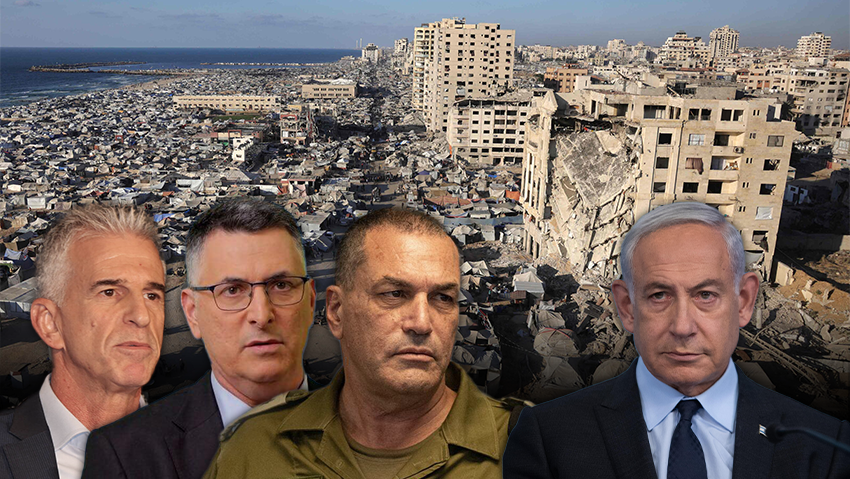Senior security officials and ministers have privately urged Prime Minister Benjamin Netanyahu in recent weeks to pursue a temporary ceasefire with Hamas rather than expand the war with a full-scale assault on Gaza City, according to Israeli officials cited Thursday by The Wall Street Journal.
At a stormy six-hour Cabinet meeting on Sunday, IDF Chief of Staff Lt. Gen. Eyal Zamir warned Netanyahu and other ministers that an invasion could lead to Israeli military rule in Gaza. Mossad Director David Barnea and Foreign Minister Gideon Sa’ar have also expressed opposition in recent weeks, joining Zamir in arguing for a ceasefire deal that could secure the release of at least some of the remaining hostages.
2 View gallery


Mossad Director David Barnea, Foreign Minister Gideon Sa’ar, IDF Chief of Staff Lt. Gen. Eyal Zamir, Prime Minister Benjamin Netanyahu
(Photo: BASHAR TALEB / AFP, Alex Kolomoisky, IDF, Yariv Katz)
The dispute underscores a widening rift between Netanyahu and parts of the security establishment over the goals of the war, its conduct and Gaza’s future. Military and intelligence leaders have repeatedly complained that Netanyahu has failed to articulate a clear endgame. Despite rising internal dissent and mounting international criticism over civilian casualties, Netanyahu has pressed ahead with plans for a major offensive in Gaza.
Officials familiar with the discussions told the Journal that Zamir, Barnea and Sa’ar believe Israel should seize the opportunity for a partial deal that would save lives and bring hostages home, rather than risk a prolonged campaign that could backfire diplomatically, legally and economically.
Sa’ar, according to associates, has warned of the growing diplomatic cost of the war as global condemnation intensifies, stressing that rescuing hostages should take precedence even if it requires halting the military operation.Netanyahu, by contrast, has stuck to a hard line. His office dismissed Hamas statements signaling openness to a deal as another “spin” and said Israel’s conditions for ending the war remain unchanged: the release of all hostages, Hamas’s disarmament and the transfer of civilian control in Gaza to a third party, while Israel retains security authority. So far, Israel has not formally responded to mediators’ proposal for a 60-day ceasefire.
Senior ministers said Zamir has repeatedly voiced objections but pledged that the military will carry out whatever the political leadership decides. “He did everything he could over the past month, in every forum, to push his approach,” one said, adding that in Sunday’s Cabinet meeting, Zamir emphasized that the army would execute the government’s orders “with excellence” despite his misgivings.
According to sources, Zamir previously presented ministers with alternative plans: one involving encirclement and raids in Gaza City without a full takeover, and another — favored by Netanyahu — calling for the city’s capture. Zamir argued his plan would endanger fewer soldiers and hostages, reduce humanitarian fallout and limit diplomatic damage, but most ministers dismissed it as insufficient to defeat Hamas.
Military leaders fear that Netanyahu’s approach could leave Israel administering Gaza by default. “The chief of staff fears military rule,” two sources said. “He understands that if Gaza City doesn’t topple Hamas, the army will be pushed deeper into the central camps, leaving a vacuum that forces the IDF to govern the population. Netanyahu hopes the fall of Gaza City alone will collapse Hamas.”

